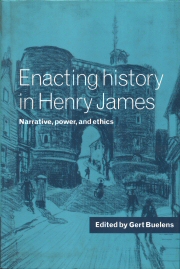Book contents
- Frontmatter
- Contents
- Notes on contributors
- Acknowledgments
- List of abbreviations
- Introduction
- 1 Power relations in the novels of James: the ‘liberal’ and the ‘radical’ version
- 2 Multiple germs, metaphorical systems, and moral fluctuation in The Ambassadors
- 3 James and the ethics of control: aspiring architects and their floating creatures
- 4 James and the shadow of the Roman Empire: manners and the consenting victim
- 5 ‘What Maisie knew’: Henry James's Bildungsroman of the artist as queer moralist
- 6 The double narrative of ‘The Beast in the Jungle’: ethical plot, ironical plot, and the play of power
- 7 Homoeroticism, identity, and agency in James's late tales
- 8 ‘A provision full of responsibilities’: senses of the past in Henry James's fourth phase
- 9 Possessing the American scene: race and vulgarity, seduction and judgment
- 10 History, narrative, and responsibility: speech acts in ‘The Aspern Papers’
- Index
8 - ‘A provision full of responsibilities’: senses of the past in Henry James's fourth phase
Published online by Cambridge University Press: 02 February 2010
- Frontmatter
- Contents
- Notes on contributors
- Acknowledgments
- List of abbreviations
- Introduction
- 1 Power relations in the novels of James: the ‘liberal’ and the ‘radical’ version
- 2 Multiple germs, metaphorical systems, and moral fluctuation in The Ambassadors
- 3 James and the ethics of control: aspiring architects and their floating creatures
- 4 James and the shadow of the Roman Empire: manners and the consenting victim
- 5 ‘What Maisie knew’: Henry James's Bildungsroman of the artist as queer moralist
- 6 The double narrative of ‘The Beast in the Jungle’: ethical plot, ironical plot, and the play of power
- 7 Homoeroticism, identity, and agency in James's late tales
- 8 ‘A provision full of responsibilities’: senses of the past in Henry James's fourth phase
- 9 Possessing the American scene: race and vulgarity, seduction and judgment
- 10 History, narrative, and responsibility: speech acts in ‘The Aspern Papers’
- Index
Summary
Narratives of literary careers, like all historical narratives, are ideologically overdetermined constructs ― a truth to which F. O. Matthiessen was by no means blind when he argued, in 1944, that Henry James's career should be understood as culminating ‘in the intricate and fascinating designs of his final and major phase’. Matthiessen's high valuation of the three novels James published at the beginning of the new century ― The Ambassadors, The Wings of the Dove, and The Golden Bowl ― was proffered (polemically, it is worth recalling) in the face of a reigning critical orthodoxy that for two decades had read James's oeuvre as a cautionary, even pathetic tale of deracination, expatriation, and subsequent decline. For Matthiessen, of course, such a misreading of James ― he singles out Van Wyck Brooks and Vernon Parrington in particular ― was ‘eloquent evidence of what happens when you divorce the study of content from form’. It is hardly surprising, then, that recent historicist and cultural critics have, in their turn, resisted the story of James's career bequeathed them by Matthiessen and his formalist, New Critical descendants; following the lead of John Carlos Rowe, contemporary James criticism has, in fact, increasingly sought ‘to question, destabilize, and render uncanny the high-modernist Henry James, whose destiny always seems to end in the intricacies of his late style and its retreat from life into the palace of art’.
As Rowe would be the first to point out, there is no question here of returning to Brooks's and Parrington's blunt dismissal of James's later fictions.
- Type
- Chapter
- Information
- Enacting History in Henry JamesNarrative, Power, and Ethics, pp. 148 - 165Publisher: Cambridge University PressPrint publication year: 1997
- 2
- Cited by



